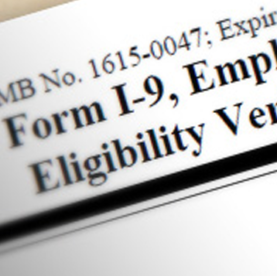What to Do if Stopped
If you are stopped by Police Officers, Immigration Agents or other public authorities, you have rights. It does not matter if you entered the country by crossing the border in Mexico, if you are an overstay, green card holder or citizen. As long as you are within the borders of the United States, you have rights. Know them. Use them.
The first one is to call your immigration law and deportation defense attorneys at Lahoud Law. With offices in Pennsylvania (Easton, Bethlehem & Allentown), New Jersey and New York, the Lahoud Law team has represented clients across the United States and has a 24/7 emergency line. It does not matter what day or time it is — pulled over or stopped by Immigration Authorities, call Lahoud Law today.
Below is a list of your rights and responsibilities.
What Are Your Rights
- You have the right to remain silent. If you wish to exercise that right, say so out loud.
- You have the right to refuse to consent to a search of yourself, your car or your home.
- If you are not under arrest, you have the right to calmly leave.
- You have the right to a lawyer if you are arrested. Call the Immigration Law and Deportation Defense Law Firm, Lahoud Law at (888) 440-4872, 24 hours a day/ 7 days a week.
- Regardless of your immigration or citizenship status, you have constitutional rights. Exercise those rights.
- You have the right to remain silent. If you wish to exercise that right, say so out loud.
- You have the right to refuse to consent to a search of yourself, your car or your home.
- If you are not under arrest, you have the right to calmly leave.
- You have the right to a lawyer if you are arrested. Call the Immigration Law and Deportation Defense Law Firm, Lahoud Law at (888) 440-4872, 24 hours a day/ 7 days a week.
- Regardless of your immigration or citizenship status, you have constitutional rights. Exercise those rights.
What Are Your Responsibilities
- Stay calm and be polite.
- Don’t interfere with or obstruct the police.
- Don’t lie or give false documents.
- Be prepared in case you are arrested.
- Remember the details of the encounter.
- Call the Immigration Law and Deportation Defense Law Firm, Lahoud Law at (888) 440-4872, 24 hours a day/ 7 days a week if you feel your rights have been violated.
What to Do If You Are Stopped for Questioning
- Remain calm. Don’t run, argue, resist or obstruct thepolice, even if you are innocent or police are violating your rights.
- Keep your hands where police can see them.
- Ask if you can leave. If the officer says yes, calmly and silently walk away. If you are under arrest, you have a right to know why. Don’t be afraid to ask why you are under arrest.
- Like every American, you have the right to remain silent and cannot be punished for refusing to answer questions. If you do not wish to speak to the officer, simply tell the officer that you want to remain silent.
- You can refuse an officer’s request to search your body or your belongings. Police are permitted to ”pat down” your clothing if hey suspect a weapon. You should not physically resist, but you have the right to refuse consent for any further search. If you do consent, it can affect you later in court.
What to Do If You Are Stopped in Your Car
- Stop the car in a safe place as quickly as possible.
- Turn off the car, turn on the internal light, open the window part way and place your hands on the wheel.
- Upon request, show police your driver’s license, registration and proof of insurance.
- If an officer or immigration agent asks to look inside your car, you can refuse to consent to the search. But if police believe your car contains evidence of a crime, your car can be searched without your consent.
- The driver and all passengers have the right to remain silent. If you are a passenger, you can ask if you are free to leave. If the officer says yes, sit silently or calmly leave. Even if the officer says no, you have the right to remain silent.
What to Do If You Are Questioned About Your Immigration Status
- You have the right to remain silent. You need not talk about your immigration or citizenship status with police, immigration agents or any other officials. You do not have to answer questions about where you were born, whether you are a U.S. citizen, or how you entered the country. Just stay quiet, as you talking could hurt your chances at potential immigration relief in the future.
- If you are not a U.S. citizen and an immigration agent requests your immigration papers, you must show them if you have them with you. If you are over 18, carry your immigration documents with you at all times. If you do not have immigration papers, say you want to remain silent.
- Do not lie about your citizenship status or provide fake documents. If you claim that you are a United States Citizen and you are not, you can face serious criminal issues. Also, it is better to remain silent, than to provide fake documents.
- Contact the Immigration Law and Deportation Defense Firm Lahoud Law at (888) 440-4872 as soon as you can. Or, contact a family member and tell them to call Lahoud Law’s twenty-four hour emergency line (888) 440-4872.
What to do if the Police or Immigration Agents Come to Your Home
- If the police or immigration agents come to your home, you can refuse them entry, unless they have a warrant.
- Ask the officer to slip the warrant under the door or hold it up to the window so you can inspect it. Yes, you can do this. Because, you HAVE rights.
- A search warrant allows police to enter the address listed on the warrant, but officers can only search the areas and for the items listed. An arrest warrant allows police to enter the home of the person listed on the warrant if they believe the person is inside. A warrant of removal/deportation (ICE warrant) does not allow officers to enter a home without consent.
- Even if officers have a warrant, you have the right to remain silent. If you choose to speak to the officers, step outside and close the door.
- Contact the Immigration Law and Deportation Defense Firm, Lahoud Law, at (888) 440-4872 as soon as you can. Or, contact a family member and tell them to call Lahoud Law’s twenty-four hour emergency line (888) 440-4872.
What to do if you are Contacted by the FBI
- If an FBI agent comes to your home or workplace, you do not have to answer any questions. Immediately contact the Immigration Law and Deportation Defense Firm, Lahoud Law at (888) 440-4872. Or, contact a family member and tell them to call Lahoud Law’s twenty-four hour emergency line (888) 440-4872. Tell the agent you want to speak to your Lahoud Law lawyer first.
- If you are asked to meet with FBI agents for an interview, you have the right to say you do not want to be interviewed. If you agree to an interview, do not go alone. Immediately contact the Immigration Law and Deportation Defense Firm, Lahoud Law at (888) 440-4872. Or, contact a family member and tell them to call Lahoud Law’s twenty-four hour emergency line (888) 440-4872.
- You do not have to answer any questions you feel uncomfortable answering and can say that you will only answer questions on a specific topic.
What to do if you are Arrested
- Do not resist arrest.
- Remain silent and immediately contact the Immigration Law and Deportation Defense Firm, Lahoud Law at (888) 440-4872. Or, contact a family member and tell them to call Lahoud Law’s twenty-four hour emergency line (888) 440-4872.
- Make sure you tell the officer that you wish to remain silent and that you want to contact your Lahoud Law lawyer.
- Do not give any explanations or excuses.
- Do not say anything, sign anything or make any decisions without your Lahoud Law lawyer.
- You have the right to make a local phone call. The police cannot listen if you call your Norris Use this call to contact the Immigration Law and Deportation Defense Firm, Norris McLaughlin at (888) 440-4872. Or, contact a family member and tell them to call Norris McLaughlin’s twenty-four hour emergency line (888) 440-4872.
- Prepare yourself and your family in case you are arrested. Memorize the phone numbers of your family members and the Immigration Law and Deportation Defense Firm, Norris McLaughlin: (888) 440-4872. Do not forget the Lahoud Law number: (888) 440-4USA.
What to do if you are taken into Immigration or (“ICE”) Custody.
- You have the right to a lawyer. Tell ICE that you want to call your lawyer and call the Immigration Law & Deportation Defense Law Firm of Lahoud Law at (888) 440-4872. Call 24 hours a day/7 days a week.
- You have the right to contact your consulate or have an officer inform the consulate of your arrest.
- Tell the ICE agent you wish to remain silent. Do not discuss your immigration status with anyone but your Lahoud Law lawyer.
- Refuse to sign any documents, such as a voluntary departure or stipulated removal, without talking to your Norris McLaughlin lawyer.
- Request and remember your immigration number (“A” number) so that you can provide it to your Lahoud Law deportation defense lawyer at Lahoud Law.
What Are Your Responsibilities
- Stay calm and be polite.
- Don’t interfere with or obstruct the police.
- Don’t lie or give false documents.
- Be prepared in case you are arrested.
- Remember the details of the encounter.
- Call the Immigration Law and Deportation Defense Law Firm, Lahoud Law at (888) 440-4872, 24 hours a day/ 7 days a week if you feel your rights have been violated.
What to Do If You Are Stopped for Questioning
- Remain calm. Don’t run, argue, resist or obstruct the police, even if you are innocent or police are violating your rights.
- Keep your hands where police can see them.
- Ask if you can leave. If the officer says yes, calmly and silently walk away. If you are under arrest, you have a right to know why. Don’t be afraid to ask why you are under arrest.
- Like every American, you have the right to remain silent and cannot be punished for refusing to answer questions. If you do not wish to speak to the officer, simply tell the officer that you want to remain silent.
- You can refuse an officer’s request to search your body or your belongings. Police are permitted to “pat down” your clothing if they suspect a weapon. You should not physically resist, but you have the right to refuse consent for any further search. If you do consent, it can affect you later in court.
What to Do If You Are Stopped in Your Car
- Stop the car in a safe place as quickly as possible.
- Turn off the car, turn on the internal light, open the window part way and place your hands on the wheel.
- Upon request, show police your driver’s license, registration and proof of insurance.
- If an officer or immigration agent asks to look inside your car, you can refuse to consent to the search. But if police believe your car contains evidence of a crime, your car can be searched without your consent.
- The driver and all passengers have the right to remain silent. If you are a passenger, you can ask if you are free to leave. If the officer says yes, sit silently or calmly leave. Even if the officer says no, you have the right to remain silent.
What to Do If You Are Questioned About Your Immigration Status
- You have the right to remain silent. You need not talk about your immigration or citizenship status with police, immigration agents or any other officials. You do not have to answer questions about where you were born, whether you are a U.S. citizen, or how you entered the country. Just stay quiet, as you talking could hurt your chances at potential immigration relief in the future.
- If you are not a U.S. citizen and an immigration agent requests your immigration papers, you must show them if you have them with you. If you are over 18, carry your immigration documents with you at all times. If you do not have immigration papers, say you want to remain silent.
- Do not lie about your citizenship status or provide fake documents. If you claim that you are a United States Citizen and you are not, you can face serious criminal issues. Also, it is better to remain silent, than to provide fake documents.
- Contact the Immigration Law and Deportation Defense Firm Lahoud Law at (888) 440-4872 as soon as you can. Or, contact a family member and tell them to call Lahoud Law’s twenty-four hour emergency line (888) 440-4872.
What to do if the Police or Immigration Agents Come to Your Home
- If the police or immigration agents come to your home, you can refuse them entry, unless they have a warrant.
- Ask the officer to slip the warrant under the door or hold it up to the window so you can inspect it. Yes, you can do this. Because, you HAVE rights.
- A search warrant allows police to enter the address listed on the warrant, but officers can only search the areas and for the items listed. An arrest warrant allows police to enter the home of the person listed on the warrant if they believe the person is inside. A warrant of removal/deportation (ICE warrant) does not allow officers to enter a home without consent.
- Even if officers have a warrant, you have the right to remain silent. If you choose to speak to the officers, step outside and close the door.
- Contact the Immigration Law and Deportation Defense Firm Lahoud Law at (888) 440-4872 as soon as you can. Or, contact a family member and tell them to call Lahoud Law’s twenty-four hour emergency line (888) 440-4872.
What to do if you are Contacted by the FBI
- If an FBI agent comes to your home or workplace, you do not have to answer any questions. Immediately contact the Immigration Law and Deportation Defense Firm, Lahoud Law at (888) 440-4872. Or, contact a family member and tell them to call Lahoud Law’s twenty-four hour emergency line (888) 440-4872. Tell the agent you want to speak to your Lahoud Law lawyer first.
- If you are asked to meet with FBI agents for an interview, you have the right to say you do not want to be interviewed. If you agree to an interview, do not go alone. Immediately contact the Immigration Law and Deportation Defense Firm, Lahoud Law at (888) 440-4872. Or, contact a family member and tell them to call Lahoud Law’s twenty-four hour emergency line (888) 440-4872.
- You do not have to answer any questions you feel uncomfortable answering and can say that you will only answer questions on a specific topic.
What to do if you are Arrested
- Do not resist arrest.
- Remain silent and immediately contact the Immigration Law and Deportation Defense Firm, Lahoud Law at (888) 440-4872. Or, contact a family member and tell them to call Lahoud Law’s twenty-four hour emergency line (888) 440-4872.
- Make sure you tell the officer that you wish to remain silent and that you want to contact your Lahoud Law lawyer.
- Do not give any explanations or excuses.
- Do not say anything, sign anything or make any decisions without your Norris McLaughlin lawyer.
- You have the right to make a local phone call. The police cannot listen if you call your Lahoud Law lawyer. Use this call to contact the Immigration Law and Deportation Defense Firm, Lahoud Law at (888) 440-4872. Or, contact a family member and tell them to call Lahoud Law’s twenty-four hour emergency line (888) 440-4872.
- Prepare yourself and your family in case you are arrested. Memorize the phone numbers of your family members and the Immigration Law and Deportation Defense Firm, Lahoud Law: (888) 440-4872. Do not forget the Lahoud Law number: (888) 440-4USA.
What to do if you are taken into Immigration or (“ICE”) Custody.
- You have the right to a lawyer. Tell ICE that you want to call your lawyer and call the Immigration Law & Deportation Defense Law Firm of Lahoud Law at (888) 440-4872. Call 24 hours a day/7 days a week.
- You have the right to contact your consulate or have an officer inform the consulate of your arrest.
- Tell the ICE agent you wish to remain silent. Do not discuss your immigration status with anyone but your Lahoud Law lawyer.
- Refuse to sign any documLahoud Law lawyer.
- Request and remember your immigration number (“A” number) so that you can provide it to your Lahoud Law deportation defense lawyer at Lahoud Law.




